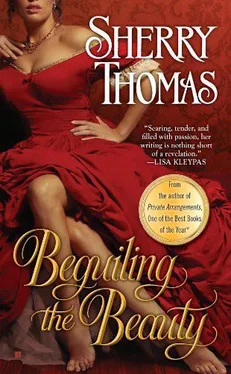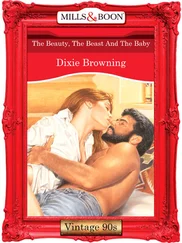The words left her in a spurt, like arterial bleeding. She was afraid of his answer. Only a man who was himself being forced would wonder whether she too was under the same duress.
He was silent for some time. “Do you not find this kind of arrangement exceptionally distasteful?”
Glee and misery—she’d been bouncing between the two wildly divergent emotions. But now there was only misery left, a sodden mass of it. His tone was perfectly courteous. Yet his question was an accusation of complicity: He would not be here if she hadn’t agreed.
“I—” She was playing the adagio sostenudo much too fast—no moonlight in her sonata, only storm-driven branches whacking at shutters. “I suppose I’ve had time to become inured to it: I’ve known my whole life that I’d have no say in the matter.”
“My cousin held out for years,” said the earl. “He should have done it sooner: beget an heir and leave everything to his own son. We are barely related.”
He did not want to marry her, she thought dazedly, not in the very least.
This was nothing new. His predecessor had not wanted to marry her, either; she had accepted his reluctance as par for the course. Had never expected anything else, in fact. But the unwillingness of the young man next to her on the piano bench—it was as if she’d been forced to hold a block of ice in her bare hands, the chill turning into a black, burning pain.
And the mortification of it, to be so eager for someone who reciprocated none of her sentiments, who was revolted by the mere thought of taking her as a wife.
He turned the next page. “Do you never think to yourself, I won’t do it ?”
“Of course I’ve thought of it,” she said, suddenly bitter after all these years of placid obedience. But she kept her voice smooth and uninflected. “And then I think a little further. Do I run away? My skills as a lady are not exactly valuable beyond the walls of this house. Do I advertise my services as a governess? I know nothing of children—nothing at all. Do I simply refuse and see whether my father loves me enough to not disown me? I’m not sure I have the courage to find out.”
He rubbed the corner of a page between his fingers. “How do you stand it?”
This time there was no undertone of accusation to his question. If she wanted to, she might even detect a bleak sympathy. Which only fed her misery, that foul beast with teeth like knives.
“I keep myself busy and do not think too deeply about it,” she said, in as harsh a tone as she’d ever allowed herself.
There, she was a mindless automaton who did as others instructed: getting up, going to sleep, and earning heaps of disdain from prospective husbands in between.
They said nothing more to each other, except to exchange the usual civilities at the end of her performance. Everyone applauded. Mrs. Clements said very nice things about Millie’s musicianship—which Millie barely heard.
The rest of the evening lasted the length of Elizabeth’s reign.
Mr. Graves, usually so phlegmatic and taciturn, engaged the earl in a lively discussion of cricket. Millie and Mrs. Graves gave their attention to Colonel Clements’s army stories. Had someone looked in from the window, the company in the drawing room would appear perfectly normal, jovial even.
And yet there was enough misery present to wilt flowers and curl wallpaper. Nobody noticed the earl’s distress. And nobody—except Mrs. Graves, who stole anxious looks at Millie—noticed Millie’s. Was unhappiness really so invisible? Or did people simply prefer to turn away, as if from lepers?
After the guests took their leave, Mr. Graves pronounced the dinner a succès énorme . And he, who’d remained skeptical on the previous earl throughout, gave his ringing endorsement to the young successor. “I shall be pleased to have Lord Fitzhugh for a son-in-law.”
“He hasn’t proposed yet,” Millie reminded him, “and he might not.”
Or so she hoped. Let them find someone else for her. Anyone else.
“Oh, he will most assuredly propose,” said Mr. Graves. “He has no choice.”












